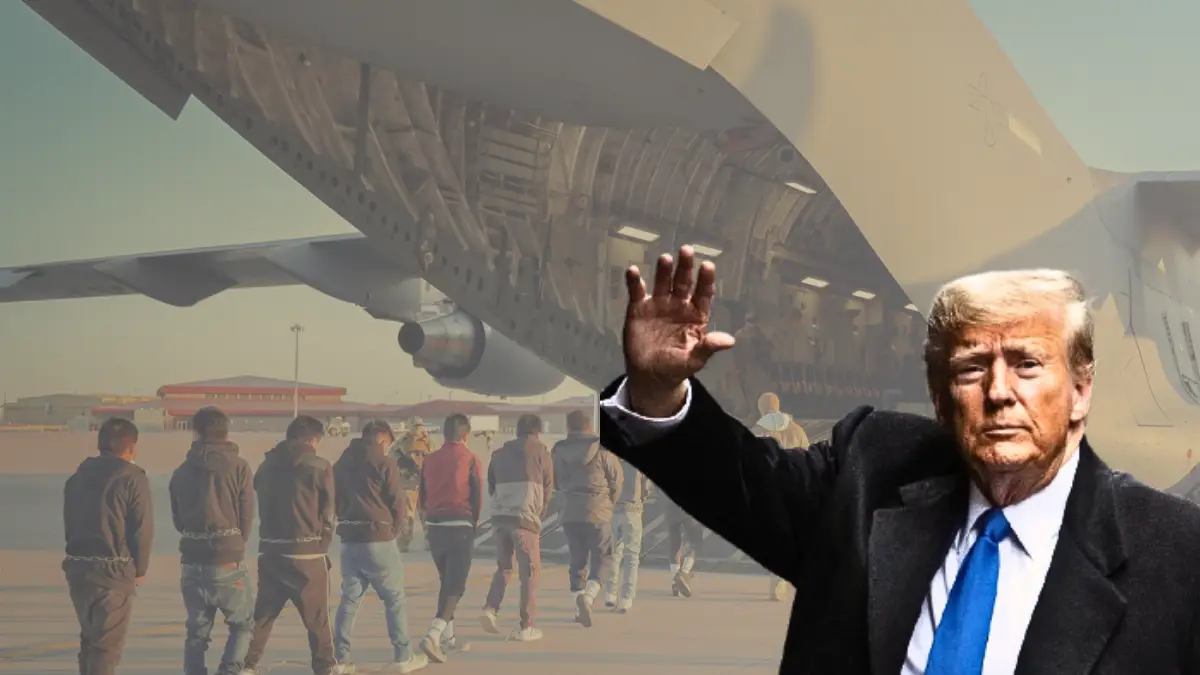
The Kingdom of Eswatini – U.S. Deportation Controversy and Global Attention
Understanding the Political and Human Rights Context of Africa’s Last Absolute Monarchy
CLAT Current Affairs 2026 | International Politics and Human Rights Analysis by CLAT Gurukul
Why in News:
The United States recently deported five immigrants from Vietnam, Jamaica, Cuba, Yemen, and Laos to Eswatini, a small landlocked nation in southern Africa, drawing global attention to the country’s autocratic governance, human rights record, and unusual role in immigration diplomacy.
Eswatini agreed to temporarily host these deportees as part of a U.S. effort to manage deportations of undocumented or unclaimed individuals. While the incident highlights an emerging pattern in third-country deportations, it also sheds light on the governance structure and social challenges of Eswatini, including its authoritarian rule, political party restrictions, and high HIV prevalence.
This event is an important topic for CLAT 2026 aspirants as it intersects with themes of international human rights law, diplomacy, global health, constitutionalism, and state sovereignty.
Introduction:
Eswatini is one of the world’s last absolute monarchies, where the king exercises supreme control over the executive, legislative, and judicial branches. Ruled since 1986 by King Mswati III, the country has often been under international scrutiny for suppressing political dissent, banning political parties, and mishandling public health crises—particularly HIV/AIDS, for which Eswatini has the world’s highest prevalence rate.
The United States’ decision to deport foreign nationals to Eswatini has sparked diplomatic interest and concern, especially regarding the treatment of detainees and the legal basis for third-party deportations to countries not of the deportees’ origin.
Point-wise Summary for CLAT Aspirants:
🔹 1. U.S. Deportation: The Immediate Trigger
- The U.S. deported five immigrants from:
- Vietnam
- Jamaica
- Cuba
- Yemen
- Laos
- These individuals were sent to Eswatini, a third-party country, not their country of origin.
- Eswatini agreed to temporarily hold these individuals until they can be relocated to their home countries.
🔹 2. Location and Regional Context
- Eswatini is a landlocked nation bordered by:
- South Africa
- Mozambique
- Capital: Mbabane
- It is one of the smallest countries in Africa, both in area and population (~1.2 million people).
🔹 3. Monarchy and Governance
- Eswatini is one of the few remaining absolute monarchies in the world—and the only one in Africa.
- King Mswati III has ruled since 1986.
- He holds complete control over all branches of government and is not just a ceremonial head.
- The king succeeded his father, Sobhuza II, who ruled until 1982.
🔹 4. Suppression of Political Dissent
- Political parties were banned in 1973 under Sobhuza II.
- Though some parties still exist, they are:
- Not allowed to participate in elections
- Reduced to functioning as civic organizations
- Public officials must be approved by traditional leaders loyal to the monarchy.
- Pro-democracy protests have increased in recent years.
- Many dissidents live in exile.
🔹 5. Renaming from Swaziland to Eswatini
- In 2018, the country changed its name from Swaziland to Eswatini, which means “land of the Swazis.”
- The king argued this was necessary to restore indigenous identity and end confusion with Switzerland.
- The country gained independence from British colonial rule in 1968.
🔹 6. HIV/AIDS Crisis
- Eswatini has the world’s highest HIV prevalence rate:
- 26% of adults are HIV positive.
- The country has long relied on:
- Foreign aid
- U.S. health programs
- World Bank assistance
- The HIV crisis has strained national healthcare and increased public health dependency on international partners.
🔹 7. Accusations Against King Mswati III
- The king is criticized for:
- Lavish spending, including fleets of luxury cars and personal jets
- Suppressing political protests and silencing dissent
- His leadership has been denounced by:
- Human rights organizations
- Opposition figures
- Global health watchdogs
🔹 8. Broader Implications of the Deportation
- Raises concerns over international legal norms around deportations.
- Sparks debate on:
- Consent of host countries
- Human rights conditions of temporary detainees
- Sovereignty vs humanitarian obligations
- Highlights a loophole in international law where stateless or undocumented persons are deported to countries with minimal legal safeguards.
Notes: Explanation of Key Terms for CLAT Aspirants
Term | Explanation |
Third-country deportation | Deporting a person to a country that is not their origin, often as a temporary holding solution. |
Absolute monarchy | A government system in which the monarch has unchecked power and is not bound by constitutional laws. |
Civic society groups | Organizations that operate independently of the government, typically focusing on community welfare, rights, and transparency. |
HIV prevalence rate | The percentage of a population that is infected with the Human Immunodeficiency Virus (HIV). |
Sovereignty | The full right and power of a governing body to govern itself without external interference. |
Relevance for CLAT 2026:
Section | Relevance |
GK & Current Affairs | Understanding geopolitics, African governance, U.S. foreign policy |
Legal Reasoning | Human rights law, international deportation norms, sovereignty vs global health |
Constitutional Law | Comparative governance: democracy vs monarchy |
Reading Comprehension | Editorial tone, understanding implicit criticism of autocracy |
Legal and International Law Dimensions:
Law | Relevance |
Universal Declaration of Human Rights (UDHR) | Right to nationality, protection from arbitrary detention or deportation |
1951 Refugee Convention | Sets principles of non-refoulement (not returning refugees to danger zones) |
Convention Against Torture | Deporting individuals to states with human rights violations may violate international law |
U.S. Immigration and Nationality Act (INA) | Governs deportation procedures and acceptable third-country agreements |
Key Takeaways for CLAT Gurukul Students:
- Eswatini offers a case study in modern-day monarchy, human rights challenges, and health governance.
- Deportations to autocratic states raise questions about legal protections and international consent.
- India’s own constitutional framework offers a stark contrast to Eswatini’s lack of political freedoms—a useful point for comparative reasoning.
- Humanitarian law and refugee protections are increasingly being tested in modern geopolitics.
Suggested Practice Questions:
MCQs:
Q1. Which country was formerly known as Swaziland?
A. Zambia
B. Namibia
C. Eswatini
D. Botswana
Answer: C
Q2. What is unique about Eswatini’s governance structure?
A. It has the world’s youngest democracy
B. It is the only absolute monarchy in Africa
C. It has no legal system
D. It is ruled by military junta
Answer: B
Q3. Why has King Mswati III’s government been internationally criticized?
A. For building nuclear weapons
B. For colonizing neighboring countries
C. For lavish spending and suppressing dissent
D. For banning all religious practices
Answer: C
Conclusion:
Eswatini, with its unique governance model, fragile healthcare system, and controversial role in global deportations, presents an important case for comparative constitutional analysis, international law interpretation, and global health diplomacy. The deportation of immigrants to such a state raises both ethical questions and legal challenges in the global order.
For CLAT 2026 aspirants, this is a relevant example of how law, governance, and geopolitics intersect—an ideal topic for both Legal Reasoning and Current Affairs sections.
This Blog is Powered by CLAT Gurukul — India’s Leading Law Entrance Prep Platform
At CLAT Gurukul, we believe in empowering future legal minds with the right blend of knowledge, strategy, and mentorship. This blog is a reflection of our commitment to quality content that not only helps aspirants stay updated but also sharpens their conceptual clarity.
Why CLAT Gurukul?
- Personalized Mentorship by Top Legal Educators
- Comprehensive Study Materials & Legal Updates
- Daily Practice Sets, Mocks & Performance Tracking
- Result-Oriented Strategy for CLAT, AILET, and CUET
Whether you’re reading this article to deepen your understanding or to stay ahead in your exam prep — you’re already one step closer with CLAT Gurukul by your side.
Join thousands of successful aspirants who trusted CLAT Gurukul and cracked India’s top law entrance exams.
Visit https://www.youtube.com/@CLATGurukul/shorts to learn more or speak to our experts now!
Note from CLAT Gurukul
At CLAT Gurukul, we are committed to providing free CLAT study material, including CLAT current affairs, legal reasoning practice sets, general knowledge updates, logical reasoning questions, English comprehension exercises, and more — all curated by top mentors.
Our blog section is regularly updated with high-quality CLAT content tailored to match the evolving pattern of the CLAT UG exam. Whether you’re looking for CLAT 2026 current affairs, CLAT legal reasoning passages, or mock practice sets, we have you covered.
We believe in open-access learning and will continue to publish free CLAT preparation resources to help serious aspirants succeed.
Explore more free content under categories like:
Best online coaching for CLAT, CLAT current affairs, CLAT GK updates, CLAT legal updates, CLAT logical reasoning, and CLAT English preparation.
For structured learning, daily mocks, and expert mentorship, visit https://www.youtube.com/@CLATGurukul/shorts — the Best CLAT Coaching in Patna and India’s most trusted platform for CLAT online coaching.




